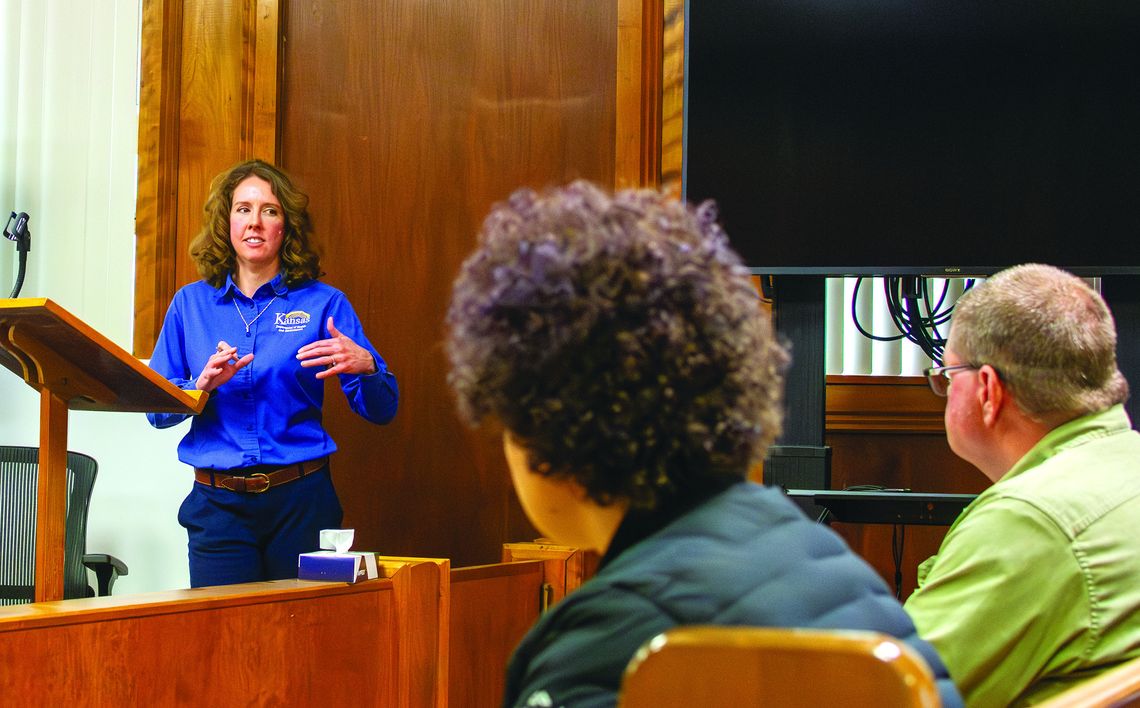OSWEGO — A Kansas Department of Health and Environment official spoke to Labette County commissioners and county solid waste committee members Wednesday about permitting and opening a landfill.
A county-run landfill is one option being explored as a longterm solution to trash management in the county. Another option is a trash incinerator.
Right now, the county has a 10-year contract with GFL Environmental to operate the trash transfer station south of Parsons. A third party hauler takes trash from the transfer station to the GFL landfill in Arcadia. GFL wants to renegotiate the contract because its representatives said the company isn’t earning enough money.
Heather Merritt, solid waste permit section chief for the Kansas Department of Health and Environment, spoke Wednesday morning.
She said there are 150 landfills in Kansas that collect either municipal waste, construction and demolition materials, industrial waste or waste tires. She said about 20 of these landfills are in old rock quarries.
Few municipalities apply for a permit to operate a landfill. The most recent permit issued took 10 years because of the steps and various studies involved. The site has to be studied because waste storage cannot be within a certain number of feet of groundwater. Public comment periods are also part of the process.
Another landfill was permitted in three years, she said. Landfills are a long-term answer to a common problem of dealing with trash. The trash and cover need to be managed daily. Liners, leachate (the ooze that trickles through the trash) collection systems and monitoring systems are involved. Some sites have leachate ponds or evaporation ponds, or the leachate is stored in tanks and taken to a wastewater treatment plant.
Once the landfill closes, it must be monitored for at least 30 years, which is expensive. This requires financial assurances from the municipality operating it that the money will be there for this work, Merritt said. This could run into the millions of dollars.
Operating a landfill also takes a number of vehicles, compactors, hauling equipment. Vehicle maintenance is an issue, she said.
She said incineration is another option after someone brought it up. Reworld Incinerator operates one in the Tulsa area that collects trash from multiple states. Water piping runs under the incinerator, which creates steam used to generate power. The ash from the trash burning is sent to a landfill. Metals are recycled from the trash.
Merritt said the last incinerator she knows of in Kansas oper-
See TRASH, Page 3.
ated in Norton County.
In the long run, incineration is a good option, she said.
Great Plains Industrial Park project manager Tim Peoples and GP director Brad Reams said the park could host an incinerator if a company such as Reworld came in to build and operate it.
“You’re not out there burying trash in the ground. We got to get away from that,” Peoples said of incineration. He said an incinerator also generates other business opportunities.
County Counselor Brian Johnson asked a number of questions of Merritt about the landfill permitting process, the cost of permitting and site selection. He wondered if closed landfills could be reopened. They can, but a new permitting process would be required.
Johnson told the committee members and commissioners that trash will never go away. It’s like death and taxes. If the county doesn’t have a landfill and operates a transfer station, there would still be added costs of trucking the trash to a landfill and paying the tipping fees to dump there. Owning a landfill is a way to alleviate that, but you own it for life, he said.
Charlie Morse, the county’s sanitation officer, said he would look into arranging a tour of the incinerator in Tulsa.
In another matter, the commission heard from Schibi on the leaky roof of Labette County Judicial Center from last week. The courts were closed while the mess was cleaned up. Water pooled on the roof and leaked into the building. Since then, the roof was torn off and replaced by Horizon Roofing. In the recent past, a work crew cut out sections of the foam roof on the building and water soaked under the foam layer. The court center reopened this week. Schibi said the county is still working with an insurance adjuster. Horizon did the work at no cost to the county, he said.




